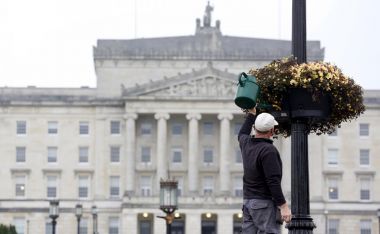Abortion vote: Northern Ireland votes against liberalisation of law
Abortion in Northern Ireland will remain illegal after assembly members voted down an attempt to allow terminations in the case of "fatal foetal abnormality".

The region's devolved assembly, Stormont, voted by 59 to 40 against the legislation proposed by two MLAs from the Alliance Party, Stewart Dickson and Trevor Lunn.
Unlike the rest of the UK, the 1967 Abortion Act does not extend to Northern Ireland where termination is only accepted if the mother's life is in danger or if there is a risk of permanent or serious damage to her mental and physical health.
After a heated debate which lasted beyond midnight, MLAs defeated a proposal that would extend that criteria to cases of "fatal foetal abnormality" and sexual crime such as rape or incest. A "fatal foetal abnormality" diagnosis means doctors believe the unborn child has a terminal condition and will either die in the womb or shortly after birth.
However a spokesman for CARE in Northern Ireland, a Christian charity who have campaigned against a change in the law, said it was not always the case the fatal foetal abnormality diagnoses result in immediate death.
Mark Baillie pointed to cases where "parents testify to how they have cherished the time spent with their children, whether it was weeks, months or in some cases even years".
"Had the amendments been passed, doctors would have become judges which is not only unfair on medical profession, it is also a dangerous precedent to set," he said.
"We do need to look at what support is currently on offer for victims of sexual violence and we certainly support pastoral help for those who experience the pain of sexual crimes committed against them."
However MLAs who brought forward the motion pointed to the case of Sarah Ewart, who publicly travelled to Britain to have an abortion after she was told her child had no chance of survival outside the womb.
"If we are to continue to fail women in Northern Ireland in this area then we are abdicating our duties as representatives," said Stewart Dickson, who proposed the amendment on fatal foetal abnormalities.
"The traumatic journey to England for many young women is becoming a shame on Northern Ireland and to force women with a fatal foetal pregnancy to look elsewhere for help and support make this worse."
Hours before the vote it was revealed Northern Ireland's Attorney General had raised serious concerns about the legality of the Alliance members' proposals.
"Providing for a criminal law exception for 'fatal foetal abnormality', as proposed by this amendment, provides unborn children diagnosed with such a disability with much less protection under the law of Northern Ireland than those without such a disability," John Larkin wrote in a letter to Trade Unionist Voice leader, Jim Allister.
At the end of the debate the Democratic Unionist Party (DUP), the main party in Northern Ireland, set up a working group to look into the issue. However other parties criticised the move as a "fudge".
Ulster Unionist leader Mike Nesbitt claimed the group, which will take six month to complete its work, was a "device" to delay a decision until after May's assembly election. He described the delay as "cruel" and "Dickensian".
"This is Bleak House we're in today, in the Chancery courts waiting day after day, after day, after day for a decision that never comes," he said.
However Social Democratic and Labour Party (SDLP) MLAs joined CARE in expressing doubts doctors could accurately predict the survival chances of an unborn child.
SDLP MLA Dolores Kelly said clinicians had told her party that "there is no such definition" as fatal foetal abnormality.











